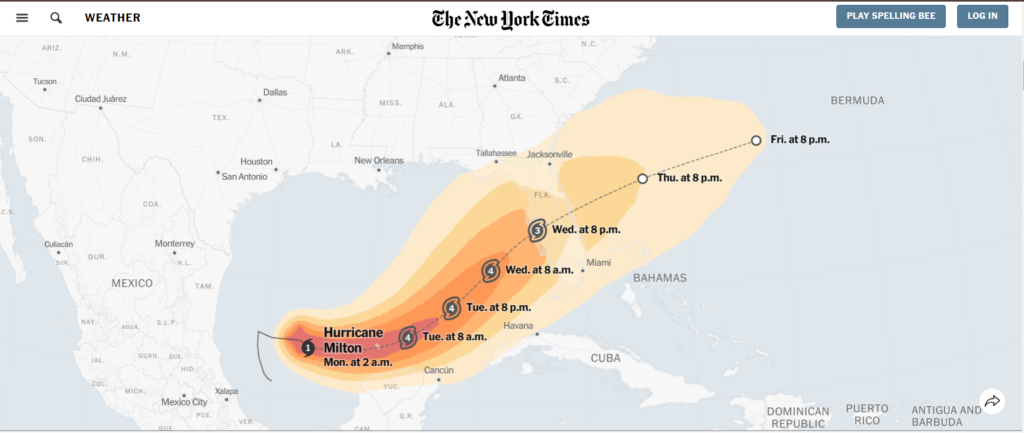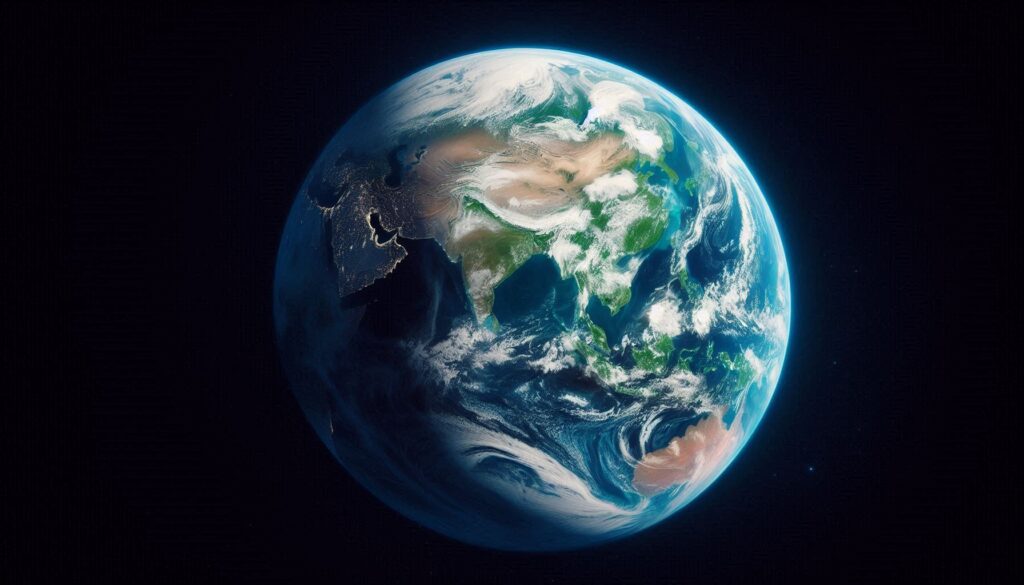Hey there! Let’s chat about something that’s been on everyone’s mind lately—hurricanes. Specifically, Hurricane Milton. If you’re in Florida, you probably know that it’s on its way, and it’s looking pretty intense. Originally a Category 1 storm, it’s expected to ramp up to Category 4 before making landfall in Pinellas County, which is no small deal.
With winds and rain coming, Florida is getting ready for a major evacuation—this is the biggest one since 2017! Schools are closing, people are packing up, and everyone’s a bit on edge. It’s like we just got over Hurricane Helene, and now we have to face another storm. So, why do these hurricanes seem to be getting stronger and hitting more often? Well, climate change is definitely playing a part in all this.

Map showing the projected path of Hurricane Milton.
Source: The New York Times [Date: 07/10/2024]
Why Are Hurricanes Getting Stronger?
Now, hurricanes have always been around, but recently, they seem to be packing more punch. A lot of that is due to climate change, which is making our planet warmer. Warmer oceans lead to stronger hurricanes. It’s pretty straightforward: warmer water gives storms more energy, which means they can grow bigger and more dangerous.
Here’s the lowdown on why hurricanes like Milton are getting more intense:
- Warm Oceans: Hurricanes are fueled by warm water. So when the ocean heats up, you guessed it—hurricanes get stronger. It’s just how nature works.
- Rising Sea Levels: Because of climate change, sea levels are rising, making storm surges worse. When a hurricane comes in, those big waves can lead to major flooding, especially when the water is already high.
- Heavy Rainfall: Warmer air holds more moisture. So, when a hurricane hits, it can dump way more rain than it used to, leading to flooding and all sorts of headaches.
All of this is connected to climate change. As the planet warms up, we can expect to see more storms like Hurricane Milton. It’s not a pretty picture, but it’s something we need to face head-on.
The Water Woes After Hurricanes
When hurricanes hit, they don’t just leave behind wind damage. One of the biggest issues is water. Floodwaters can contaminate drinking water and mess up sewage systems. It’s not just about losing power or dealing with fallen trees—people might find their water isn’t safe to drink anymore.
Take the aftermath of Hurricane Helene, for example. Many parts of Florida were still trying to deal with dirty water and broken sewage systems. And now with Milton looming, folks are worried about how their water supply will hold up again.
Here’s where Genviss steps in. We work hard to make sure people have access to clean drinking water, even in the chaos that hurricanes bring.
How Genviss is Making a Difference
At Genviss, we know that hurricanes create a lot of mess, but we’re ready to help communities bounce back. Here’s what we do:
- Cleaning Up Floodwater: Flooding can bring all sorts of harmful stuff into the water—think chemicals, sewage, and who knows what else. Our Membrane Bio-Reactor (MBR) and Ultra-Filtration Systems help filter out all the nasty bits, ensuring that people have safe water even after a storm.
- Recycling Wastewater: Hurricanes can overload sewage systems, leading to spills in local water sources. Not great! Our Zero Liquid Discharge (ZLD) system helps recycle wastewater, so it doesn’t end up polluting the environment.
- Stormwater Runoff Solutions: When storms hit, rainwater can carry dirt and pollutants into rivers and lakes, which is bad for drinking water. We use Physio-Chemical Treatment to clean that up, keeping water safe for everyone.
- Emergency Water Treatment: After a hurricane, it’s crucial to get clean water to people quickly. That’s why we have mobile water treatment plants that can be set up anywhere, providing safe drinking water when it’s needed most.
- Partnering with Experts: We collaborate with global leaders in water treatment to ensure we’re always up to date with the best technology and practices. It’s all about being prepared for whatever comes our way.
Looking Ahead: What’s Next for Water Management?
Let’s face it: hurricanes aren’t going anywhere. With climate change, they’re only going to get stronger, which means we need to rethink how we manage water during these big storms.
At Genviss, we’re constantly looking for ways to improve our response to disasters. We want to make sure our water treatment solutions are effective, so communities can recover faster. It’s all about staying ahead of the curve and finding better ways to deal with these challenges.
In the future, water management will have to be more resilient and efficient. We’ll need systems that can handle stronger storms and emergency plans that ensure clean water reaches people quickly.
In Conclusion: Let’s Work Together
Hurricane Milton is a serious reminder that climate change is real, and it’s affecting our homes and our water. As hurricanes keep getting stronger, having solid water management systems in place is more important than ever.
At Genviss, we’re committed to helping communities face these growing challenges. But it’s not just up to us; everyone has a role to play. Whether it’s using water wisely, supporting eco-friendly solutions, or pushing for policies that tackle climate change, it’ll take all of us to make a real difference.
Hurricanes like Milton are here to stay, but with smart planning and good teamwork, we can lessen their impact. Genviss is ready to help every step of the way.


Pingback: A Breakthrough in Water Safety: On-Site PFAS Destruction Technology - Genviss : Engineering Sustainable Solutions for Water, Energy, and the Environment